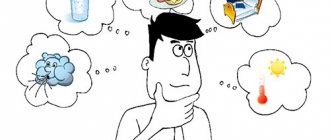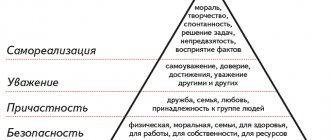Man, like any living creature, is programmed by nature to survive, and for this he needs certain conditions and means. If at some point these conditions and means are absent, then a state of need arises, which causes the emergence of selectivity in the response of the human body. This selectivity ensures the occurrence of a response to stimuli (or factors) that are currently the most important for normal functioning, preservation of life and further development. The subject’s experience of such a state of need in psychology is called need.
So, the manifestation of a person’s activity, and accordingly his life activity and purposeful activity, directly depends on the presence of a certain need (or need) that requires satisfaction . But only a certain system of human needs will determine the purposefulness of his activities, as well as contribute to the development of his personality. The human needs themselves are the basis for the formation of motive, which in psychology is considered as a kind of “engine” of personality. The motivation of human behavior and activity directly depends on organic and cultural needs, and they, in turn, generate interest, which directs the individual’s attention and activity to various objects and objects of the surrounding world with the aim of their knowledge and subsequent mastery.
Human needs: definition and features
Needs, which are the main source of a person’s activity, are understood as a special internal (subjective) feeling of a person’s need, which determines his dependence on certain conditions and means of existence. The activity itself, aimed at satisfying human needs and regulated by a conscious goal, is called activity. The sources of personality activity as an internal driving force aimed at satisfying various needs are:
- organic and material needs (food, clothing, protection, etc.);
- spiritual and cultural (cognitive, aesthetic, social).
Human needs are reflected in the most persistent and vital dependencies of the body and the environment, and the system of human needs is formed under the influence of the following factors: social living conditions of people, the level of development of production and scientific and technological progress. In psychology, needs are studied in three aspects: as an object, as a state and as a property (a more detailed description of these meanings is presented in the table).
The meaning of needs in psychology
| Need for quality | Understanding the need |
| object | need is understood as a need (need) for a comfortable existence and normal activity (and life) of a person |
| state | needs are studied from the point of view of states of the human psyche, which reflects the absence (or shortage) of something |
| properties | need is considered as a fundamental property of a person, which determines his relationship to the surrounding reality |
In psychology, the problem of needs has been considered by many scientists, so today there are quite a lot of different theories that understand needs as a need, a state, and a process of satisfaction. So, for example, K.K. Platonov saw needs primarily as a need (more precisely, a mental phenomenon of reflecting the needs of an organism or personality), and D.A. Leontyev considered needs through the prism of activity in which it finds its realization (satisfaction). The famous psychologist of the last century, Kurt Lewin, understood needs primarily as a dynamic state that arises in a person at the moment he performs some action or intention.
Analysis of various approaches and theories in the study of this problem suggests that in psychology the need was considered in the following aspects:
- as a need (L.I. Bozhovich, V.I. Kovalev, S.L. Rubinstein);
- as an object to satisfy a need (A.N. Leontyev);
- as a necessity (B.I. Dodonov, V.A. Vasilenko);
- as the absence of good (V.S. Magun);
- as an attitude (D.A. Leontiev, M.S. Kagan);
- as a violation of stability (D.A. McClelland, V.L. Ossovsky);
- as a state (K. Levin);
- as a systemic reaction of the individual (E.P. Ilyin).
Human needs in psychology are understood as dynamically active states of the individual, which form the basis of his motivational sphere. And since in the process of human activity not only the development of personality occurs, but also changes in the environment, needs play the role of the driving force of its development and here their substantive content is of particular importance, namely the volume of material and spiritual culture of mankind that influences the formation of needs people and their satisfaction.
In order to understand the essence of needs as a driving force, it is necessary to take into account a number of important points highlighted by E.P. Ilyin. They are as follows:
- the needs of the human body must be separated from the needs of the individual (in this case, the need, that is, the need of the body, can be unconscious or conscious, but the need of the individual is always conscious);
- need is always associated with need, which must be understood not as a deficiency in something, but as desirability or need;
- from personal needs it is impossible to exclude the state of need, which is a signal for choosing a means of satisfying needs;
- the emergence of a need is a mechanism that includes human activity aimed at finding a goal and achieving it as a need to satisfy the emerging need.
Needs are characterized by a passive-active nature, that is, on the one hand, they are determined by the biological nature of a person and the deficiency of certain conditions, as well as the means of his existence, and on the other hand, they determine the activity of the subject to overcome the resulting deficiency. An essential aspect of human needs is their social and personal character, which finds its manifestation in motives, motivation and, accordingly, in the entire orientation of the individual. Regardless of the type of need and its focus, they all have the following characteristics:
- have their own subject and are an awareness of need;
- the content of needs depends primarily on the conditions and methods of their satisfaction;
- they are capable of reproducing.
The needs that shape human behavior and activity, as well as the motives, interests, aspirations, desires, drives and value orientations that result from them, constitute the basis of individual behavior.
Professional orientation
Each profession requires the possession of specific character traits that are necessary to achieve success in that field. In psychology, several personality types are defined:
Realistic type
They prefer physical labor and working with real objects. The following professions suit them most: builder, technician, mechanic.
Conventional type
The personality is attentive, focused and calm in nature. Such people are responsible and always complete their work on time. Preferred professions: librarian, merchandiser.
Intelligent type
These people love to think and learn new information. They love to do research work. The most suitable professions: teacher, writer.
Enterprising type
Such individuals have leadership qualities and are excellent at managing. The following professions are suitable: manager, businessman.
Social type
People with a well-developed sense of empathy who strive to help others. The following professions are suitable: doctor, social worker.
Artistic type
Such individuals do not like to work according to a schedule and put themselves into any kind of framework. They are unpredictable and creative. Best professions: artist, poet.
Types of human needs
Any human need initially represents an organic interweaving of biological, physiological and psychological processes, which determines the presence of many types of needs, which are characterized by strength, frequency of occurrence and ways of satisfying them.
Most often in psychology, the following types of human needs are distinguished:
- depending on the origin, natural (or organic) and cultural needs are distinguished;
- according to their focus, they distinguish between material and spiritual needs;
- depending on what area they belong to (areas of activity), they distinguish needs for communication, work, rest and cognition (or educational needs );
- human social needs are also distinguished ;
- in origin, needs can be endogenous (arising from the influence of internal factors) and exogenous (caused by external stimuli).
In the psychological literature there are also basic, fundamental (or primary) and secondary needs.
The greatest attention in psychology is paid to three main types of needs - material, spiritual and social (or social needs ), which are described below in the table.
Basic types of human needs
| Types of needs | Description |
| material | are the basis of human life |
| spiritual | are unique to humans and characterize their level of development |
| social | are a reflection of the social nature of man, among which the most significant are the needs for work and communication |
The material needs of a person are primary, since they are the basis of his life. Indeed, in order for a person to live, he needs food, clothing and shelter, and these needs were formed in the process of phylogenesis. Spiritual needs (or ideal) are purely human, since they primarily reflect the level of personal development. These include aesthetic, ethical and cognitive needs.
It should be noted that both organic and spiritual needs are characterized by dynamism and interact with each other, therefore, for the formation and development of spiritual needs, it is necessary to satisfy material ones (for example, if a person does not satisfy the need for food, he will experience fatigue, lethargy, apathy and drowsiness, which cannot contribute to the emergence of a cognitive need).
Separately, we should consider social needs (or social), which are formed and developed under the influence of society and are a reflection of the social nature of man. Satisfaction of this need is necessary for absolutely every person as a social being and, accordingly, as an individual.
Social and psychological qualities of personality
The properties and qualities of personality in social and psychological terms in social science do not have a single clear definition. In the scientific works of psychologists there are several different opinions on this topic. Here are the main ones:
- If we interpret the term “personality” as a synonym for the word “person,” then qualities mean characteristics. If personality is a component of qualities, then human traits are determined by social properties.
- Sometimes the concept of “socio-psychological traits” includes the opposition of basic and secondary properties (from the perspective of differences between personal and general psychological).
- The structure of an individual is perceived as a set of traits and properties. Or, on the contrary, as a specific system consisting not of qualities, but of other elements.
Based on this list, it is clear that it is difficult to unambiguously determine the socio-psychological properties of a person. Because, firstly, there is no specific list of such qualities and criteria for identifying them. Secondly, there are contradictions in the relationship between abilities and properties. All these aspects require close attention. Their essence will be studied by sociologists and psychologists for a long time.
Classifications of needs
Since psychology became a separate branch of knowledge, many scientists have made a large number of attempts to classify needs. All these classifications are very diverse and mainly reflect only one side of the problem. That is why, today, a unified system of human needs that would meet all the requirements and interests of researchers of various psychological schools and directions has not yet been presented to the scientific community.
The author of the first classification of needs is considered to be Epicurus, who back in 3 thousand BC. divided the desires (or needs) of a person into the following groups:
- natural and necessary human desires (it is impossible to live without them);
- natural desires, but not necessary (if there is no possibility of satisfying them, then this will not lead to the inevitable death of a person);
- desires that are neither necessary nor natural (for example, the desire for fame).
Author of the information theory of emotions P.V. Simonov divided needs into biological, social and ideal, which in turn can be the needs of need (or preservation) and growth (or development). Social and ideal human needs, according to P. Simonov, are divided into needs “for oneself” and “for others.”
The classification of needs proposed by Erich Fromm is quite interesting. The famous psychoanalyst identified the following specific social needs of a person:
- human need for connections (group membership);
- need for self-affirmation (feeling of significance);
- need for affection (need for warm and reciprocal feelings);
- the need for self-awareness (own individuality);
- the need for a system of orientation and objects of worship (belonging to a culture, nation, class, religion, etc.).
But the most popular among all existing classifications is the unique system of human needs by the American psychologist Abraham Maslow (better known as the hierarchy of needs or pyramid of needs). The representative of the humanistic trend in psychology based his classification on the principle of grouping needs by similarity in a hierarchical sequence - from lower to higher needs. A. Maslow's hierarchy of needs is presented in table form for ease of perception.
Hierarchy of needs according to A. Maslow
| Main groups | Needs | Description |
| Additional psychological needs | in self-actualization (self-realization) | maximum realization of all human potential, his abilities and personality development |
| aesthetic | need for harmony and beauty | |
| educational | the desire to recognize and understand the surrounding reality | |
| Basic psychological needs | in respect, self-esteem and appreciation | the need for success, approval, recognition of authority, competence, etc. |
| in love and belonging | the need to be in a community, society, to be accepted and recognized | |
| in safety | need for protection, stability and security | |
| Physiological needs | physiological or organic | needs for food, oxygen, drinking, sleep, sexual desire, etc. |
Having proposed his classification of needs, A. Maslow clarified that a person cannot have higher needs (cognitive, aesthetic and the need for self-development) if he has not satisfied basic (organic) needs.
Formation of human needs
The development of human needs can be analyzed in the context of the socio-historical development of mankind and from the perspective of ontogenesis. But it should be noted that in both the first and second cases, the initial ones will be material needs. This is due to the fact that they are the main source of activity of any individual, pushing him to maximum interaction with the environment (both natural and social)
On the basis of material needs, human spiritual needs developed and transformed, for example, the need for knowledge was based on satisfying the needs for food, clothing and housing. As for aesthetic needs, they were also formed thanks to the development and improvement of the production process and various means of life, which were necessary to provide more comfortable conditions for human life. Thus, the formation of human needs was determined by socio-historical development, during which all human needs developed and differentiated.
As for the development of needs during a person’s life path (that is, in ontogenesis), here, too, everything begins with the satisfaction of natural (organic) needs that ensure the establishment of relationships between the child and adults. In the process of satisfying basic needs, children develop needs for communication and cognition, on the basis of which other social needs appear. The process of upbringing has an important influence on the development and formation of needs in childhood, thanks to which the correction and replacement of destructive needs is carried out.
Development and formation of human needs according to the opinion of A.G. Kovaleva must obey the following rules:
- needs arise and are strengthened through the practice and systematicity of consumption (that is, the formation of a habit);
- the development of needs is possible in conditions of expanded reproduction in the presence of various means and methods of satisfying them (the emergence of needs in the process of activity);
- the formation of needs occurs more comfortably if the activity necessary for this does not exhaust the child (ease, simplicity and a positive emotional attitude);
- the development of needs is significantly influenced by the transition from reproductive to creative activity;
- the need will be strengthened if the child sees its significance, both personally and socially (appraisal and encouragement).
In addressing the issue of the formation of human needs, it is necessary to return to the hierarchy of needs of A. Maslow, who argued that all human needs are given to him in a hierarchical organization at certain levels. Thus, every person from the moment of his birth in the process of growing up and developing his personality will consistently manifest seven classes (of course, this is ideal) of needs, starting from the most primitive (physiological) needs and ending with the need for self-actualization (the desire for maximum realization personality of all its potentialities, the fullest life), and some aspects of this need begin to appear no earlier than adolescence.
According to A. Maslow, a person’s life at a higher level of needs provides him with the greatest biological efficiency and, accordingly, a longer life, better health, better sleep and appetite. Thus, the goal of satisfying basic needs is the desire for the emergence of higher needs in a person (for knowledge, self-development and self-actualization).
"I-concept"
"I-concept"
is a dynamic system of a person’s ideas about himself, which includes a person’s awareness of his qualities (physical, emotional, intellectual), self-esteem, as well as subjective perception of external factors influencing a given personality.
“I-concept” is close to the concept of “self-awareness”, but rather “I-concept” is the result of self-awareness.
“I-concept” arises as a result of a person’s social interaction with his environment. The environment influences the formation of the “I-concept”, however, then the “I-concept” begins to determine the way a person interacts with the social environment.









